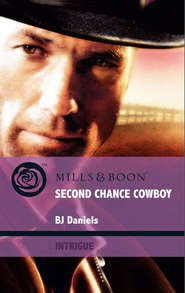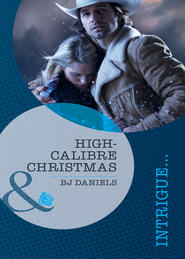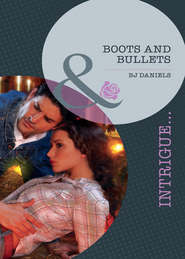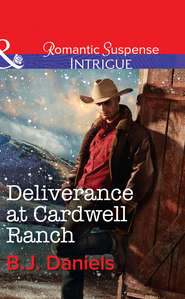По всем вопросам обращайтесь на: info@litportal.ru
(©) 2003-2025.
✖
Premeditated Marriage
Автор
Год написания книги
2019
Настройки чтения
Размер шрифта
Высота строк
Поля
She turned to look back at the counter. The key to the rental car was gone.
She moved slowly across the cold concrete to the car. Even from a distance she could see that the glove compartment was open, the small bulb illuminating one dark corner of the car—and the garage.
Walking around to the passenger side, she opened the door, not surprised he’d left the key in the ignition. He’d wanted her to know that he’d been here. Because he’d left her something.
The clipping had been torn from the newspaper, the edges ragged, the paper still damp from the storm. He’d left it where she couldn’t miss the headline: Missing Missoula Man Found At Bottom Of Freeze Out Lake. Foul Play Suspected In Doctor’s Death.
Chapter Three
Augustus brushed fresh snow from his jacket as he stepped through the door into the Pinecone Café. He should have been freezing cold. He definitely was wet, first from the rain, then the snow. Obviously, he wasn’t prepared for this kind of weather, but he didn’t care. He was on the chase—and he loved nothing better.
A hush fell over the café as everyone turned to look at who’d come through the door. He shrugged out of his lightweight jacket, realizing his dress shirt and slacks made him conspicuous enough, but now they were wet. He could feel all eyes on him. Forget anonymity in Utopia, he thought as he hung the jacket next to five tan canvas coats in various sizes, styles and stages of decline.
Feeling as if he was on center stage, he turned slowly to take in the café—and its customers. The Pinecone was just a hole-in-the-wall with three booths and a half-dozen stools along a worn counter that faced the grill. A middle-aged couple sat in the first booth, two men in the next, the third empty.
At the counter, an elderly woman knitted, her large bag on the stool next to her. A middle-aged woman in a waitress uniform and nurse’s shoes stood across the counter from her smoking a cigarette, looking as if she owned the place. At the far end of the counter, a lone man sat bent over his coffee. He didn’t look up.
“Good evening,” Augustus said to the curious faces.
“Evenin’,” the woman behind the counter replied. All except the guy at the counter gave him a nod, the women a polite smile as he worked his way past them to the empty booth. Friendly little place, wasn’t it?
He slid in, his back to the wall so he could watch the door, an old habit.
Conversations resumed. The two men in the next booth talking about a tractor that the one named Leroy couldn’t get to run. The middle-aged couple eating in silence, a sure sign they were married, and at the counter, the older waitress chatting with the knitter about a sweater she’d started for her granddaughter. The lone twenty-something man seemingly in his own world.
“Hi!” A perky young bottled blonde in a too-tight uniform came out of the kitchen to slide a plastic-covered menu across the table at him. “Our special is chicken-fried steak. Comes with soup, salad, mashed potatoes, gravy, peas, a roll and dessert for six-fifty.”
Amazing. “Sold,” he said, smiling as he slid the menu back at her without opening it. She looked to be in her late twenties, about Charlotte “Charlie” Larkin’s age, if Emmett was to be believed, and she was a hell of a lot friendlier, both things Augustus hoped to use to his advantage.
She gave him the full effect of her smile. “Can I get you some coffee?”
“I’d love a cup. It’s a little damp out there.”
She laughed at that, considering he was soaked to the skin and wearing the least appropriate clothing possible. Everyone else in the place had on jeans or those tan canvas pants that seemed to be so popular in this town along with flannel shirts and winter boots.
“It’s going to get a whole lot damper,” she said, coming back with the coffeepot and a cup. She poured him some and said, “Supposed to drop a good eight inches of snow before morning.”
Just what he needed. He’d have to buy a coat and boots. Fortunately he’d had the sense to bring a pair of jeans. “Isn’t it too early in the year?”
She laughed. “This is Montana. It can snow any month—and has.” She left and came back with a bowl of steaming vegetable soup. It smelled wonderful and tasted even better.
He ate his soup quickly, needing the warmth and hungrier than he’d been for a while. His clothes were starting to dry out, and while he was more comfortable, some of his earlier elation was starting to wear off and he wasn’t sure why. He suspected it was because Charlie Larkin wasn’t at all what he’d expected—and not just because she was female. He’d known his share of female killers and knew that they came in all sizes and shapes. Some were even as cute and innocent-looking as Charlie.
No, something else about her bothered him and he couldn’t put his finger on it.
He blamed his sudden uneasiness on the fact that, while what evidence there was pointed to Charlie Larkin—it was only circumstantial. Nor was this the way he normally operated. All the other times, he’d come in after the arrest had been made, after the killer was behind bars—or out on bail. This time he was going after the murderer himself. This time, it was personal.
Taking a sip of his coffee, he reassured himself that he was dead-on with this case. What evidence there was had led him straight to Charlie Larkin—and his gut instincts hardly ever let him down. Except for that one time, which he tried not to dwell on.
But that one mistake had taught him well. He’d trusted one of his subjects and it had almost cost him his life—and his career. That’s why he would never let himself get emotionally involved with a suspect, again.
Not that there was any chance of that with this case, he thought, remembering the churlish young woman in the baggy overalls he’d met at the garage. So at odds with her angel-cute face, the freckles, the big brown eyes, framed by all that dark-flame hair. Oh, yeah, he could see how a woman with her looks and spunk would be like honey to bears to most men.
But he wasn’t most men. So what was it about Charlie Larkin that had him worried? Something about her reminded him of Natalie. The thought shook him to his core. He glanced out the window, feeling too isolated, too ill-prepared for the weather—and this dinky little town. How was he going to be able to accomplish anything without even rudimentary services? He’d tried to make a call from his motel room, which—big surprise—had no phone and he got no service on his cell phone.
He’d seen two pay phones so far, one tacked on the wall a few feet inside the café door and a primitive-looking one outside Larkin’s. Neither exactly private. And the one was out in the weather and way too close to Charlie Larkin.
The conversation at the all-male booth had changed to the price of lumber and those damn tree huggers who were ruining the logging industry.
The woman in the waitress uniform put out her cigarette. “So, Leroy, did I hear you’re still trying to get that old tractor running?” she inquired of the suspender-wearing man in the booth. She had a face with a lot of miles on it and a voice gravelly from smoking.
“Got to, Helen. Can’t afford a new one. Goin’ to have to plow snow with it pretty darned soon. Maybe Charlie’ll have a look at it when she gets the time,” he said, wagging his head.
Helen, who no doubt was the café’s owner, looked over in Augustus’s direction. “Get settled in at Murphy’s, Gus?”
Gus. It wasn’t bad enough that Charlie Larkin had told everyone in town about him, she hadn’t even gotten his name right. “It’s Augustus,” he said and gave Helen a smile to soften it. “Augustus T. Riley.”
She chuckled as if he’d said something funny, obviously not recognizing the name. “Well, welcome to Utopia. You’re the big news of the day.”
“Slow news day, huh,” he said, seeing an opening. “I would think that fellow who got pulled out of the lake would still be news.”
“Shoot, that was over a week ago. Old news now and not the kind we like to be known for.” She stepped back into the kitchen and proceeded to finish up some cooking she had going on. “Trudi, your orders are up.”
He wondered what kind of news Utopia liked being known for.
“Here ya go, T.J.,” Trudi said cheerfully as she slid a plateful of food across the counter to the guy sitting alone. She wasted a big smile on him. He didn’t even bother to look up at her, just grunted something Augustus couldn’t hear.
Trudi stood there for a moment, then went to deliver a couple of burgers to Leroy’s table and brought Augustus his salad. “Was creepy though, you know, if you think that his body was in the lake all this time,” she said, picking up the thread of the earlier conversation.
“Since last fall,” he agreed, trying not to think about it. “So, did you know him?”
She shook her head. “He wasn’t from around here.”
Augustus knew that. Josh Whitaker had been an emergency-room doctor in Missoula at the hospital. He was thirty-four, two years younger than Augustus, single and lived with two other residents in a large house near the hospital. His death was being investigated as possible foul play after the coroner reported Josh had been hit in the back of the head with a blunt object, his car then pushed into the lake where it sank from view.
No one knew what Josh Whitaker was doing in Utopia, thirty miles from the nearest real town. In this part of Montana, that thirty miles felt like three hundred. Augustus had never felt such isolation and couldn’t imagine why Josh had come up here all the way from Missoula. Josh had been missing for almost a year, his body finally discovered in late September by two local teenagers, just before the cold spell.
But what Augustus knew that the press didn’t, according to phone company records, was that Josh had received two phones calls from Utopia just before he disappeared. Both from the pay phone outside Larkin & Sons Gas and Garage. He’d almost placed several phone calls to that pay phone, along with another to a C. Larkin that same day, the call to C. Larkin less than a minute in length, making Augustus wonder if Josh had reached Charlie. Her name had also showed up in an old date book of Josh’s with a notation beside it: help line.
What Augustus needed was to find out what Charlotte “Charlie” Larkin’s relationship had been with Josh Whitaker, how they’d met no doubt through Josh’s statewide help line program, why Josh might have come to Utopia to see her and why she might want him dead. No small task.
But hadn’t Emmett mentioned that Charlie Larkin had to quit college when her father had his heart attack? Was it possible she and Josh had met while she was attending the University of Montana in Missoula? That was where Josh had started his first help line.
“What a terrible way to die,” Trudi was saying. “Drowning.” She shivered.
“I heard it’s not that bad, like going to sleep,” the knitting woman said.
“Marcella, I think you’re confusing drowning with hypothermia,” Helen said.











